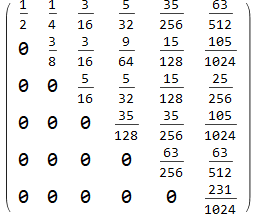Implicitly assumingAssuming that one deals with series expansion around $(s,t)=(0,0)$ we can define
cf[k_, n_] :=
Series[1/Sqrt[(1 - t^2) (1 - s^2 t^2)], {s, 0, 2 k}, {t, 0, 2 n}] //
Normal // Coefficient[#, s^(2 k) t^(2 n)] &
We have defined cf to get only even coefficients (2k), (2n), since the others do vanish.
e.g.
cf[4, 6]
105/1024
Table[cf[k, n], {k, 6}, {n, 6}] // MatrixForm
One can get the same with Array as well
Array[cf[#1, #2]Array[ &cf, {6, 6}] == Table[cf[kTable[ cf[k, n], {k, 6}, {n, 6}]
True
This appraoch would be satisfactory for small {n, k}. For bigger ones there is SeriesCoefficient (as another answer recalled).
sf[k_, n_]:= SeriesCoefficient[ 1/Sqrt[(1 - t^2) (1 - s^2 t^2)], {s, 0, 2k}, {t, 0, 2n}]
Array[ cf, {6, 6}] == Array[ sf, {6, 6}]
True
And sf is much better than cf:
AbsoluteTiming[sf[350, 400];]
{0.0015182, Null}
AbsoluteTiming[cf[350, 400];]
{10.2873, Null}

